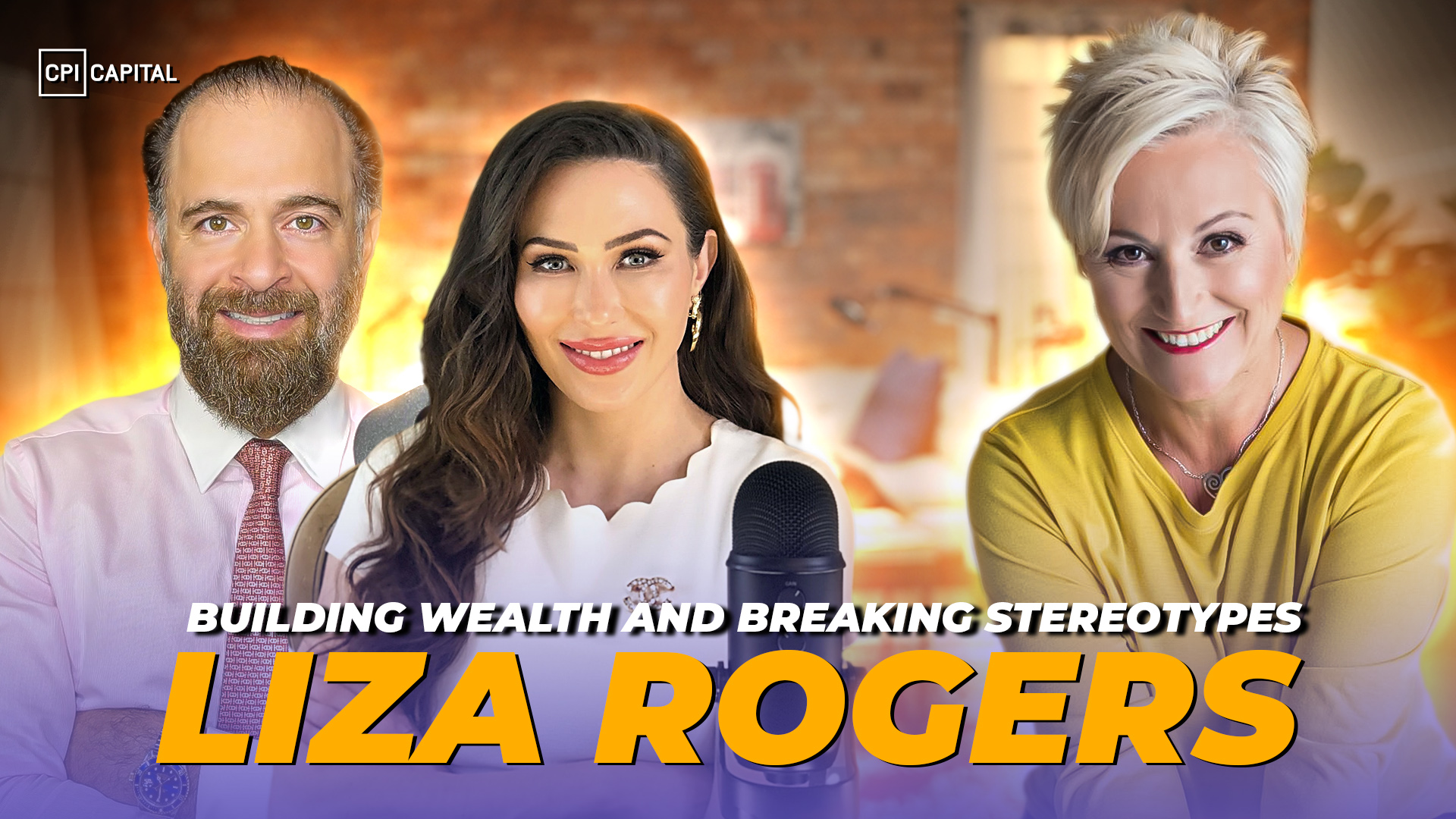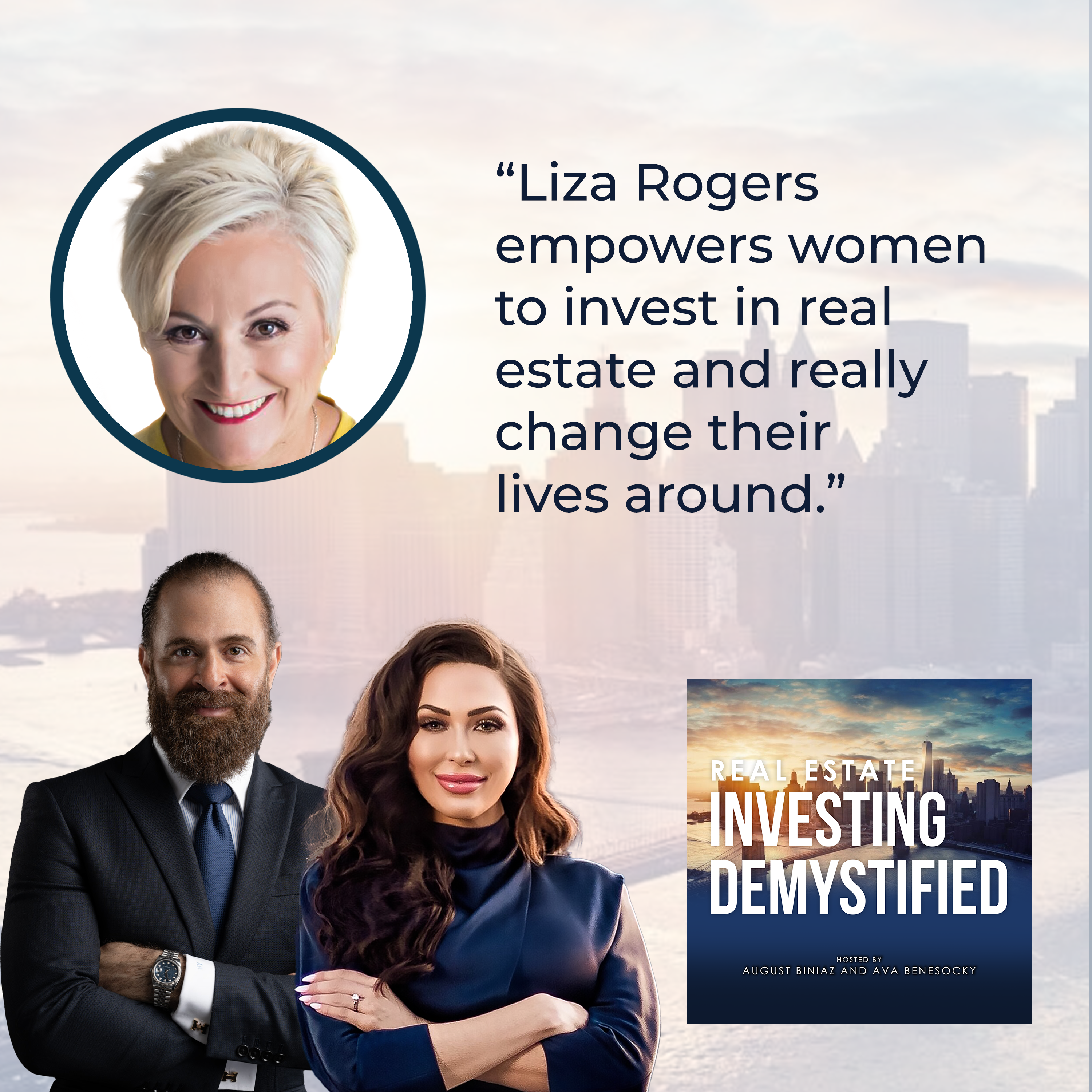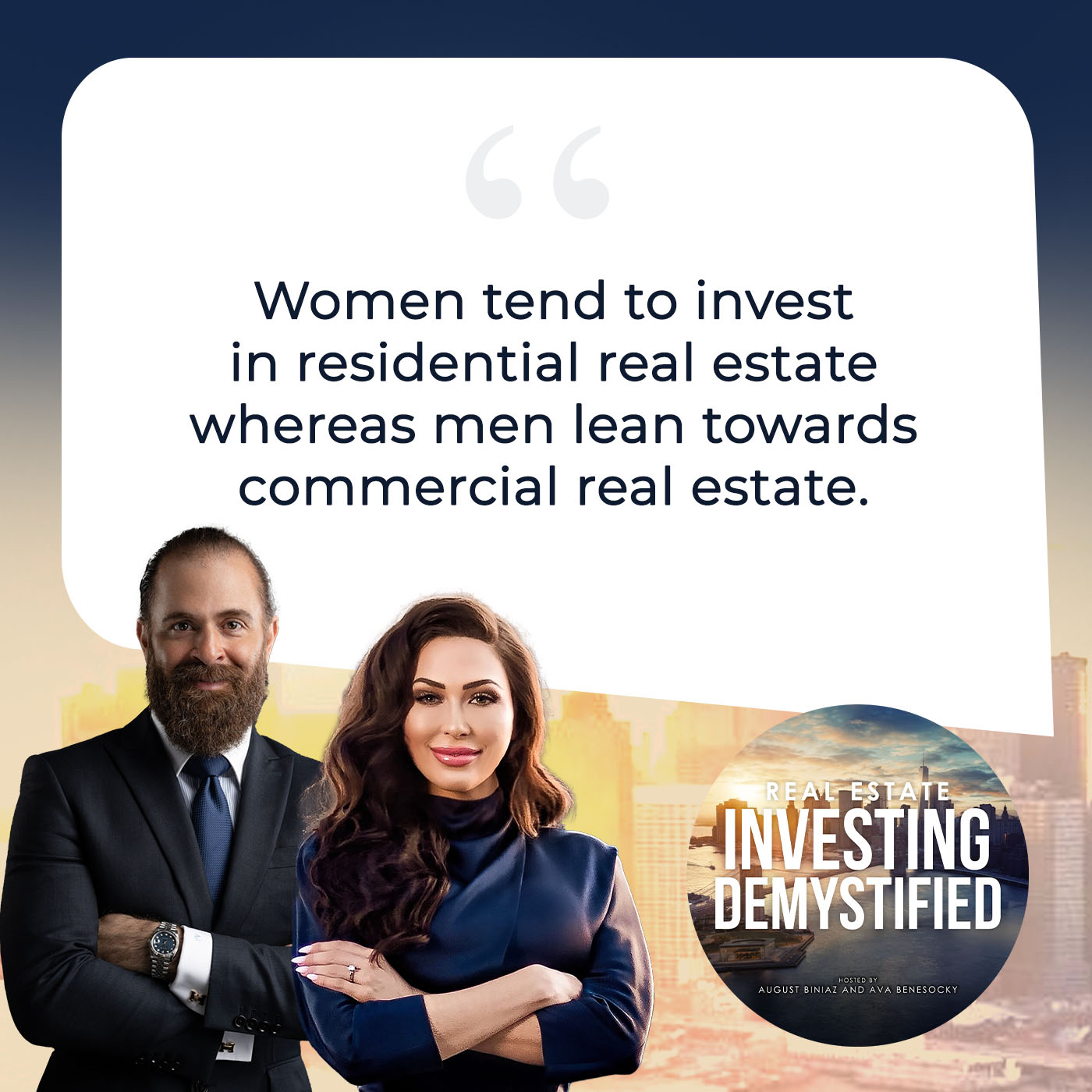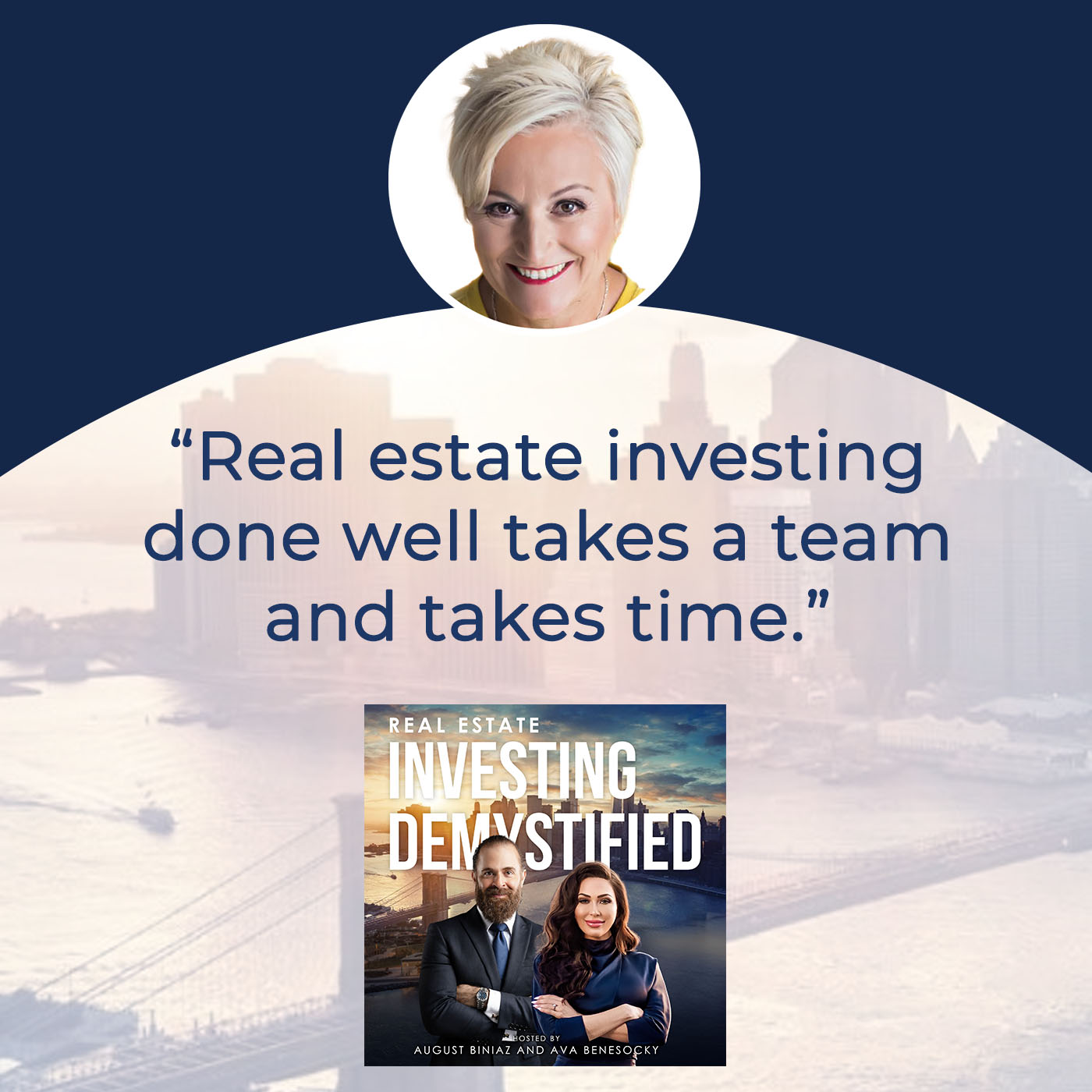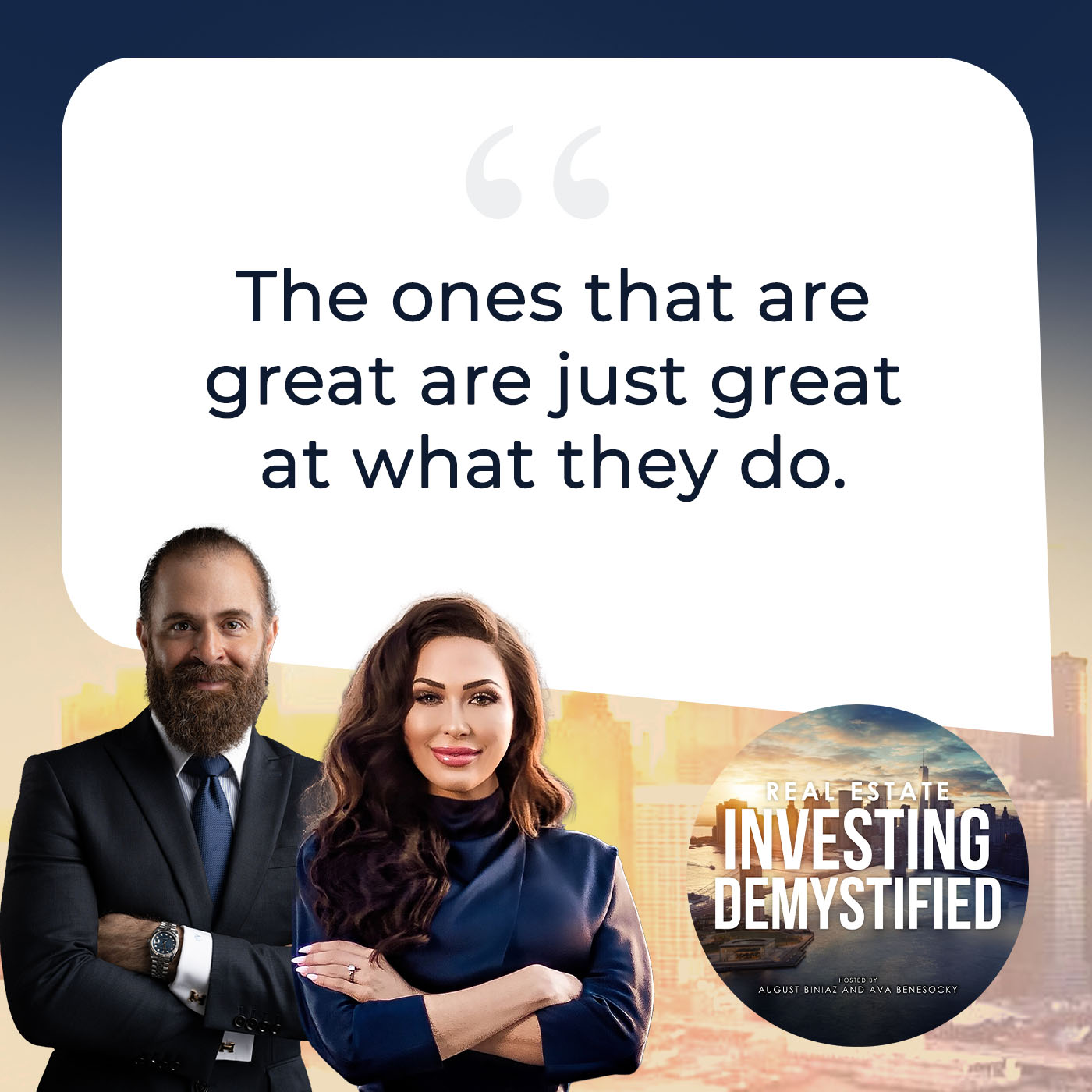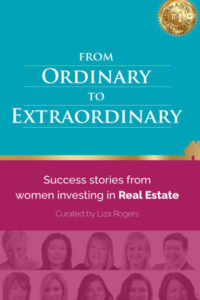Did you know only 30% of real estate investors are women? It’s time to change that. In this empowering episode, we celebrate the women making strides in a male-dominated industry, as real estate leader and founder of Women’s Real Estate Network (WREN), Liza Rogers shares her mission to inspire more women to invest. From the differences in how men and women approach real estate investments to the challenges women face in taking control of their finances, we dive deep into gender dynamics, collaboration, and the importance of community in building wealth. Join us as we explore how women are transforming the real estate landscape—one investment at a time.
—
Watch the episode here
Listen to the podcast here
Important Links
- Liza Rogers – LinkedIn
- Liza@WREN.club
- WREN.club
- From Ordinary to Extraordinary
- Rich Dad Poor Dad
- Think and Grow Rich
- The Madness of Crowds
- The Strange Death of Europe
- WREN Woman Real Estate Network – Liza Rogers
About Liza Rogers
Liza Rogers is a dynamic force in both real estate investment and community development. With over 30 years of experience spanning global tourism, events, and real estate investment, she brings a unique perspective to her work. From managing international vacation properties to leading groups on European river cruises and overseeing Eco guesthouses in Australia, Liza’s diverse background has shaped her holistic approach to real estate. As the founder of the Women’s Real Estate Network (WREN), based in British Columbia, Liza is committed to fostering collaboration and empowerment, particularly for women, in the real estate industry. Her portfolio includes projects ranging from a 145-acre subdivision in Otter Point to a four-plex rental property in Esquimalt and a 8-unit ocean view co-housing apartment. Driven by a desire to share her knowledge and empower others, Liza organized the innovative Victoria Real Estate Investment Expos and spearheaded initiatives to educate and support women in navigating the complexities of real estate investing. Her dedication to creating positive social, cultural, and environmental impact through her work exemplifies her belief that wealth extends beyond monetary gain. What’s next….a second book to follow her best seller and buying Boutique Hotels for cashflow and future retirement in destinations that are welcoming location independent, remote workers and retirees
Women In Real Estate: Building Wealth And Breaking Stereotypes – Liza Rogers
Everybody, welcome back to the show. It’s Mister August Biniaz’s birthday. Happy birthday, August.
Happy birthday.
I said, “August, should we cancel the guest speaker on Thursday as it’s your birthday?” He was like, “I am so proud to be doing our YouTube show on my birthday.” That was something that we’re excited to be here. We’re particularly excited because I have a good friend of mine who’s on the show, Liza. We coauthored a book together From Ordinary to Extraordinary.
For people who have bought the book, we wrote this book around three years ago now. Time flies. We’re going to go back to the ten women who wrote their chapters in the book and we’re going to get everybody to add to their chapter some of the success that they’ve had in those past three years. We’re excited about that. Anything to add?
Are you guys going to rewrite a new version of the book?
We’re going to do an ebook update of all the things that have happened in the last three years. We came out of COVID. We’ve had some successes. We’ve had some struggles. We’re in a real estate spin cycle. How do we manage that? Some of us have continued. Some are running the hell away from real estate as far as they could get. Some of us are investing in other businesses. We’ll do an updated ebook and then what we hope to do. Following up after that is adding some new authors and getting some new stories. That will be a follow-up to where we are now, what we accomplished, what we struggled with, and then onwards we go.
Real Estate Statistics
Liza has lots of passion for trying to get women to invest in real estate, come together, and motivate one another. That’s exciting stuff. If August has anything to add, go ahead but I wanted to share some key statistics on the difference between women and men investing in real estate because some of these stats are incredible.
Yes, they’re shocking and Liza is going to be out there trying to empower women to invest in real estate and change their lives around. One of the stats is historically real estate investing has been male-dominated. A lot of people know this, but in recent studies, women make up about 30% of real estate investors.
That much?
Yeah, but. On a personal level, what we’ve experienced at CPI Capital on a deal that we closed, Atlas at Bay Point Apartments, we had 57 investors. It was a $17,000,000 acquisition, of which five of them were women investors. Only 8% of our investors were women, which was shocking to me but it is what it is.
I’m so proud of the woman who invested. Good for you. Another stat was woman investors tend to be more conservative than men. They often focus on stability instead of income generation rather than high risk, high reward. Women usually tend to invest in residential real estate as men lean more towards that commercial real estate.
Are you saying commercial is more risky than residential?
I don’t think so but it depends.
There are some reasons behind it. I’m sure we’re going to talk a little bit about that.
We’ll get all into that. The next one is that studies have shown that women generally have lower risk tolerance compared to men. It’s hard for them to take that step.
They don’t do any picks, flips, and ground-up developments then because that’s the riskiest part of real estate if you do ground-up development.
I’m sure there’s probably 30% of women that have no problem getting there.
When they say, investors, that’s a very broad thing to say. Investor. Is an investor somebody buying their primary residence, is that considered an investor?
It is a first-time buyer.
That could be a first-time home.
I can speak to some of that. I’m putting it in my mind here.
These are all great stats, Ava. Let’s go through the regular sequence of our show.
People need to understand these stats because this is what Liza backs. It’s her run group, her Women’s Real Estate Investing Network, which is very powerful. I want to share some of these stats so that people are like, “This is very interesting.” There are some positive things as well. Single women account for 19% of home buyers in the US and 9% are men. In Canada, it’s 25% to 30% of women will own their home, and 15% to 22% of men.
Are these single?
These are single-family homes.
It’s very important to specify that. When it comes to single men or single woman buying their primary residence both in Canada and the US, more women own their primary residence than men do. Maybe men are out there using that money to be able to find a woman. They’re buying cars and clothes.
That’s probably where those stats are from.
Let me know when you want me to jump in with some of the additions because August, you’re bringing up some good points. What is also behind these stats? The stats are sometimes shocking, and the stats make you ponder, and then you start to peel off those layers and you look at what’s behind the statistics. That’s where you get into the juicy stuff.
Let’s go ahead and introduce our guest. We’ve had Liza on our show before. It was an interesting show. I rewatched it before getting on our show. Why don’t you go ahead and introduce our guest, Ava, and we can start the show.
I would love to. Liza Rogers is a dynamic force in both real estate investment and community development. She has 30 years of experience spanning globe global tourism events and real estate investment. She brings a unique perspective to her work. From managing international vacation properties to leading groups on European river cruises and overseeing eco-guest houses in Australia.
Liza’s diverse background has shaped her holistic approach to real estate. She’s the founder of Women’s Real Estate Network, WREN, based in British Columbia. Liza is committed to fostering collaboration and empowerment, particularly for women in the real estate industry. Welcome to the show, Liza. We’re very happy to have you here.
I’m very happy to be here. It’s nice to see you both again, August and Ava. It’s great to be here and great to talk about all things real estate, investing, empowerment, and lifestyle. We’re investing in real estate because we want a particular lifestyle. We want a particular future for ourselves, our families, and our communities. I know you guys have a growing family and that’s important to you.
Let’s get into this. I was raised by a single mother and two sisters. I grew up in an all-women’s household. My mom, blood, sweat, and tears, raised us and built me into the man I am now. I wouldn’t call myself a feminist. I think women don’t need you to be their cheerleaders for them to be successful.
The ones who are great are great at what they do. That’s what comes there and the company that I cofounded is run by a woman. She’s a CEO. She’s also my wife. Keep in mind that some of the critical items that I might bring up or being the devil’s advocate are not coming from a place of masculinity or anti-woman.
If there’s any woman cheerleader, I’m the poster child of it. Let’s talk about this. At the core of it, why do women even need to have a support network when it comes to real estate investing financial literacy? Are they handicapped in this world? Is it that men have taken over and they have a monopoly where they don’t let women get involved? Is it because men are just better at it? What is it? Let’s talk about the core of it.
Women’s Real Estate Network
August, I love this and I love the fact that we’re talking about the whole feminism thing and feminist because I don’t call myself a feminist either. I don’t like the term toxic masculinity. There’s nothing toxic about being masculine. I think there are a lot of things that feminism has done to injure the relationships between men and women.
What we are trying to maybe find our way back to in the culture that we’re living in right now is to let men be men and let women be women. We’re biologically programmed. There’s a whole spectrum of where we are but we’re fighting each other with where we’re supposed to be. To answer a couple of those questions, I love working with men.
I was going to real estate conferences in the early days. I was going to Real Estate Investment Network with Don Campbell and Patrick. You guys are involved with Rain, and going into the US with Fortune Builders and Than Merrill. These are great guys and they are doing great things. I love being in a room with them, but there are a lot of women who have some fear around being in that room with the guys.
Women invest differently. We are the community builders. We are the nurturers. We are more collaborative than competitive. There’s nothing wrong with either investment style. We have to recognize it. Instead of trying to eliminate the differences between men and women, we need to celebrate them and say that men bring this to the table and women bring this to the table. Women have been bringing things to the table for a shorter period in the business world. We’re not used to planning in each other’s sandboxes yet.
Instead of trying to eliminate the differences between men and women, we need to celebrate them and say men bring this to the table and women bring this to the table. Share on X
I’m excited about having a platform for women, but we welcome men and we’re opening it up to more men now. I’m going to be honest here. I get frustrated sometimes with the ladies because they take too damn long to make decisions sometimes. I’m getting to that point now where I’ve laid the foundation for the women. The Women’s Real Estate Network has been around now for eight years. We’ve done a ton of interesting stuff. We’ve made investments. We’ve done land development. We bought apartment buildings. We’re looking now at boutique hotels.
We’re looking at the longevity of women because we are living longer so we need a longer runway. We need to build wealth for potentially 8 to 10 years longer than your average man. I think the key point as to why women need a network is that women have only had full control over their own money for less than 50 years.
They did not even have the right to vote. You can see in some of those backward countries in certain places around the world, some in the Middle East, and some other places, that women don’t have some basic rights. They’re forced to dress in certain ways. In the country that I’m from, Iran, women still wear an obligatory headscarf and what have you. It’s the Sharia Law or what have you. There is a lot of backward stuff when it comes to that around the world.
The pendulum swings, but it does swing the other way. It’s the same thing with homosexuals. It was difficult to be a homosexual, and that pendulum swings. Now, you have it too extreme on one side. Some people would say with Gay Pride, men walking naked, and the promotion of homosexuality in schools. The women’s movement as well.
What I dislike is this. I love free-market capitalism. I love the best to be where they’re at, but if you’re doing it just out of the show, just to get that quota, or you’re doing it for optics, I don’t appreciate that. If women are good at what they do, like Ava’s dynamic within CPI Capital, our plan was for her position to be different in the company.
When she came to the conversations, she would have with investors, be it even some of the high net worth super sophisticated ones, she connected with them a lot better than our IR team, even myself, or other team members. She took the lead there. Also, the communication with our investors, her input about marketing, and a lot of different systems and processes.
She came in and she did a way better job than myself or anybody else could do. She excelled at that and she got the position. It wasn’t for optics purposes. At times, in the corporate world, the pendulum has swung much. That is what you see. Going back to what you’re doing, what do you see as a woman investor’s Achilles’ heel? Is it the fact that they’re risk averse, which is sometimes a good thing in business, or is it the fact that they’re risk averse that they don’t even take that first step? What is it?
Women Investors
I think it’s the fact that it’s still, generally speaking, a new concept for a lot of women. If you think about the fact that women still had to have their husbands sign for their mortgage up until the 1980s in North America, we’re not talking about the Middle East. We’re not talking about developing countries. We’re talking about if you were a woman and you went in to buy a house, the first question that you were asked by the banker within 50 years was, “Where’s your husband? Where’s the person who’s signing on this account?”
When you look at the fact that men have had access to property and globally speaking, for millennia, the kingdoms controlled the villages. The villagers fed the kingdoms. The villagers were protected by the kingdoms. Free market and capitalism. This is it. We could have this. We could write a book on how the Industrial Age broke us free from that. In post-World War II, everybody was all of a sudden able to access automobiles, buy single-family homes, and move out to the suburbs.
Many more people in the world have owned property in a short period of time. In the last 100 years, the number of people globally who now own property is 100 times more than it was pre-World War 2. Before that, there was also a massive jump. We look at those Black Swan events. We look at massive global movements forward. There are several things with women.
We’re getting into a lot of the weeds here, but the birth control pill suddenly gave women the power to not necessarily be in a position where they’re going to have 5 to 10 children. Now, they can choose how many children they have in many parts of the world. Many people you know right now, we have a crisis globally because people are not having enough children. That’s another whole conversation we can have, and many women are staying single.
There are a couple of things at play here. First of all, we need the guys to step up. We want successful men. If you ask a lot of women, “What kind of man are you looking for?” “We’re looking for a man.” That seems obvious but we’re looking for someone who has traveled the world, who understands business, who’s had some struggle, who knows how to pick himself up, dust himself off, and go forward.
To get back to that answer to your question, women had such a short period of time playing in the sandbox. It’s 50 years where we’ve been like, “I’ve got my own credit card. I’ve got my own bank account. I’ve started my own business with no co-signers.” That is still very new. It’s like we’re teenagers on the evolutionary scale and we’re figuring out what our next steps are.
We talked a little bit about some statistics. Because many women are staying single, more single women are not getting married or not having children. I’m one of those not necessarily by choice. It’s the way that things have worked out so far. I’m 55. It’s probably unlikely that I’ll have kids but I’m still hoping the man of my dreams is out there.
You look great for 55, by the way.
You look amazing.
Thank you very much. Those Zoom filters are hot. Part of the key is that we’re not waiting for a man anymore to make those big decisions. To your point about 19% of single women are buying houses, whereas only 9% of single men are buying their first houses or their first residential property, that’s because women aren’t waiting. There’s an interesting thing that Kim Kiyosaki said quite a few years ago and I think, we’re talking about some of the things that we got wrong. She made a statement in one of her books, and she’s married to Robert Kiyosaki of Rich Dad Poor Dad.
They’re no longer married.
Yes, but she made this very pointed statement that became a mantra for a lot of women. The statement is, “A man is not a plan.” That’s a scary thing when you think about it because we’ve got this generation of women who are now thinking, “I can do everything else on my own. I don’t need a man.” but a man should be part of the plan. A man should be part of your plan.
One of the things that we’re in crisis right now is loneliness. The global epidemic we’re suffering from right now is the epidemic of loneliness. Men are struggling with that. Women are collaborating and connecting together. I use my Mom’s community in Mexico, 50 expat women who are all senior citizens. I’m probably going to write a book about them when I go down there this year. They are the poster women and poster people for how we need to live in our retirement in a community, using economies of scale, having a great life, sharing, and having each other’s backs. When I talk about them, I get full-body goosebumps because they are the epitome of how we want to live our lives.
I wanted to say one more thing about whether men just do better. Maybe a lot of women too. As time has gone on, I don’t know if it’s pressured or because more women are single. Growing up with both my parents, they both worked. My mom was working. My dad was working. There is this attractiveness also for men looking at women when women do have that independence as well. I think women were also looking at how well men were doing real estate and saying, “Look at me.” I could probably look up to them. There’s admiration there and let me see how I can do it.
I wanted to ask a question from Liza about the caveats and the difficulties women have in business and investing. We touched on that. What are the competitive advantages that women have that you’ve seen over the last years that they inherently do better than men? Is it the connection with others and collaboration?
That’s such an easy answer. Women are natural community builders. We are the relationship builders. This is another thing that we’ve been talking about a lot lately. Simon Sinek and Steve Bartlett did a great talk on Diary of a CEO about relationships and friendship. This is one of those things where women are succeeding and men are struggling.
Men aren’t building friendships. If you ask a lot of your guy friends, especially the younger guys, “If you had an emergency and you couldn’t reach your family, which friend would you call?” A lot of them don’t have an answer and that’s heartbreaking. This circles to being a great answer to the question. One of the things with WREN when I started the community, I’m a single woman. I was brought up by a single mom.
There are massive advantages and disadvantages to being in that situation. My mom is part of my why. The life that I want to build for myself is part of my why. I don’t want to be a woman who reaches 65 and is dependent on the government, doesn’t have assets, doesn’t have a community, and is alone dying watching television.
How many people do we hear that happens to? When I started WREN, the core reason for starting it was to build a collaborative group of women together, like-minded, who love traveling, who wanted to spend half a year, being remotely working or living overseas and have that community to say, “We’ve built our real estate empire and our investment empire. Now, we can go and live in Thailand for six months or we can go and live in Mexico for six months because we’ve done that and we’ve done it together.”
Now, we’ve got these friendships. Do you know what? It’s happened. It’s worked. When I went down to Mexico last year, using my Mom’s circle of friends as an example, I had three friends come down. Three of my friends came down. They stayed with me and my mom and my mom’s friends. They looked at this group of women and they said, “That’s who we want to be when we grow up.”
Mind you, these are all women of my age. They’re 55 years old and they’re looking at these 70-year-old or 80-year-old women saying, “This is who we want to be when we grow up.” That collaboration, building friendships, and nurturing friendships. Friendships, relationships of any kind. You guys are married. You know what it’s like. It takes work.
You don’t wake up every day and say, “We’re going to have another easy day of being in love.” It takes work. It takes effort. Friendships are very important nowadays because many marriages aren’t working. We don’t necessarily have the same kinds of marriage longevity but we have life longevity. People are living to 80, 90, or a 100-years-old. How much of that do you want to spend by yourself?

Women In Real Estate: Friendships are so important nowadays because so many marriages aren’t working. We don’t necessarily have the same kinds of marriage longevity, but we have life longevity. How much of that do you want to spend by yourself?
That’s what I love about the community that you built, Liza, because if you ask anybody how easy is it to make a friend, it’s not an easy thing to do.
I guess to me, I think it’s super easy. It’s as easy as picking up the phone but how many people pick up the phone these days?
If you go back and look at this more from an evolutionary and historical perspective, men are competitive. We compete with each other for everything, food or status. Modern civilization has been in somewhat play for the last 10,000 years. We’re talking about a few million years of our species, the homo sapiens being around. Our branch has been there for a few million years. We’ve been competing with each other, killing each other, and all kinds of stuff but the women have been there helping, protecting, and keeping each other. When it comes to collaboration, it matches that.
Commercial Real Estate
Let’s continue the conversation here. What you’ve built works perfectly for women who want to get involved and get started in real estate investing, feel comfortable investing, build something, collaborate, meet partners, and so on. Ava and I, we’re in the commercial real estate space, particularly multifamily, syndication, fund management, real estate private equity, and all those big words.
In our space in more than five years now, it’s rare for us to see a woman in any type of executive position. Ava has a good friend who is one of the rare people who manages the private equity firm, The Fund. She’s a trailblazer, but they’re very rare. Almost always, except the item that I just touched on is always men unless they’re in a position of sales and they’re there to sell a service or a product.
You’ve been in it for eight years, have you guys ever spoken about breaking into that space when it comes to commercial real estate? Why is it that we don’t see a lot of women when it comes to places in commercial areas? It’s somewhat anecdotal. I don’t have data to back it but we’ve never seen, for example, somebody doing underwriting, somebody doing project management, or somebody doing analysis. It always seems to be men. Does it go back to evolutionary DNA that doesn’t interest women?
I did some research on this too, and a little stat for you. In Canada, there’s about 3% of women are in leadership roles in real estate private equity. On the REIT side, there are about 40 in Canada. Let’s say there are about 40 public REITs, there are about 2 to 5 women who are CEOs of those.
It is like 5% to 10%.
These are great questions, and these are great conversations to have. We could probably do a full weekend workshop on this because it’s very interesting. I could go deep and peel back the layers, but I know we’ve got a limited amount of time. I think it’s a combination of things. First of all, talking about the competition and the collaboration, you talked about matching.
We are unique and men do compete. We have to stop looking at that as a bad thing. That’s who you are. It’s not toxic masculinity. It’s who you are. It’s biology. That competition was needed in our evolution because you have to protect the village. You had to compete with the lions, the tigers, and other tribes. We have to stop looking at that as, “My god. That was bad.”
This is where I think the pendulum is starting to swing back now. We’ve gone far with the woke brigade and I think we’re starting to swing back a little bit. Competition is great. We just watched the Olympics. The people who are the best in the world, who have trained, who have sacrificed, and who have painfully gone through processes, mindset, and vision to get to the place that they are. That’s inspiring. It’s very inspiring. There’s nothing wrong with being competitive. Being competitive gives us things to look up to and look at with pride, “Look at how great that person did.”
There's nothing wrong with being competitive. Being competitive gives us things to look up to and look at with pride. Share on X
On the other side of that is the awesome thing that the women bring more to the table, which is nurturing and the community. We needed the women in the village. It takes a village to raise a child. There’s that whole thing. I’ve been using the village concept a lot lately because one of the things I’m working on is a program that helps get people back to the village. Get your multigenerational families together, buy the villa in Italy, and everybody move back and live off the land. Get your group of best friends together and buy a five-bedroom house in Kitsilano and live in that when you’re retired rather than living on your own.
The pieces are that we have to celebrate the collaboration and the competition. We’re just starting to learn that we can work with these things together. To your point, August, about how many women CEOs there are and how many women are in this space, it’s only been open to women for a shorter period. There are several places where women are finding their natural leadership fit. Community building. You see a lot of women in the nonprofit spaces.
Interestingly, when I started WREN, the number of people who gave me shit for starting it as a for-profit organization rather than a nonprofit, it’s like, “How can you not have WREN as a nonprofit organization?” I said, “It is because I want to teach women that it’s okay to be profitable.” We should be aiming towards being profitable because we can do way more when we’ve got money in our genes than when we can’t.
Get to the point where you’re profitable. Get to the point where you’ve put yourself first, you’ve built your empire, and then you can go out and change the world. It’s much harder to change the world if you’re going from a place of starving students, poverty, or leading a protest down the street rather than having a foundation with millions of dollars of endowment. I think the opportunities for women to enter those spaces, they’re now here and now women are trying to find their way in.
The other thing that we can come back to is what are women interested in. If I have my druthers, am I interested in underwriting or being a CEO in a real estate corporation? That might not be where my actual interest lies. One of the things we talk about often is that my background is tourism and events. For all of the land development that I’ve done and the numbers that I’ve crunched, my passion has been hosting great dinner parties.
You’re good at it.
I’m good at it. I love bringing my mini United Nations communities together with people who I’ve traveled with and gotten to know from all over the world and sitting down to dinner with. Having eight-hour dinners and wine. Solve the world’s problems because we’ve got a multigenerational, multicultural, and multi-socioeconomic group of people. We sit down and we all realize that we want the same things.
Joining WREN
Let’s talk about that group. Let’s talk about a journey. Somebody hears about your group, possibly from this show or otherwise. Talk to us about their journey to take. They get in touch with you. What happens? Do they come in? Do you do you assess them? Do you triage them? Do you see where they fit the best? I’ll then have a follow-up question to that.
Yes, exactly. We’ve changed quite a bit. When we first started, I wanted to help everybody and you can’t. I would get people phoning me saying, “I’m a single mom. I don’t have a job, and I don’t have any money, but I want to buy a house.” I’m like, “There are a few steps that you need to take first. I’m not the person that’s going to be able to help you yet.”
Now, we have a quiz that we send out and we find out where people’s levels are. We ask people who come into the group that they’re going to participate because one of the things that you want when you’re forming a group of high-powered, let’s call it an intentional community where we all want to grow together. That means you have to do some work.
There is no passive investing per se. If you’re going to be a passive investor, you become a passive investor because you’ve done the work to understand what that is and now you’ve got the luxury of being able to say, “I’ve read the 80-page offering memorandums. I’ve done the due diligence with the lawyer. I’ve looked at the properties. I’ve looked at the REIT. I’ve talked to my financial adviser, and now I can invest in this and sit back a little bit.”
What we’re working through now is finding women who’ve got some capital. They may often be too busy. They want to collaborate because collaboration is easier. I often say, “Share the risk and the reward, and then share the rest and the relaxation.” I’m coming to you from the apartment building that we bought in Victoria.
I’m in an eight-unit apartment building right across the street from the beach. I have a beautiful ocean view. We bought this building on 15,000 square feet of land for $3.5 million. We’ve got eight units in it. We can develop it. We can probably build two six-plexes in the future or a twelve-unit condo but we own the land. We own the building. We own everything.
A group of friends got together and did this. We have people sometimes drive by on bicycles who say, “I was looking at buying that building once.” I said, “We did.” There’s often an hour-long chat that ensues. It’s about getting people together and being able to do that. Women who are coming in now are coming in with a little bit more knowledge.
We’re getting more men coming in. They’re coming in with a bit more knowledge, and now they can take some of those steps. Now it’s like, “What are we going to buy next?” Now, we’re going to buy a boutique hotel property in Mexico. Maybe we’re going to look at a boutique hotel in Florida because I want to come hang out with you guys more often.
Anytime.
She’s talking about it nonstop. Liza, you started renting back in what year?
It is 2016.
You’ve seen the growth of WREN and it’s grown over the years. I think the last time we spoke, you were saying, “Ava, there are tons of people who want to be involved, that want to apply to come join WREN and it’s grown a lot over the years.” It seems like there’s been a lot more women that are flooding in to learn more.
One of the things that’s happened, first, we went through COVID. It wasn’t that long ago, so we came out. We’ve tried pivoting a couple of times and now it feels like we’re just making a lot of changes that we’re going to see in September and into the new year. We’re getting more into the coaching because a lot of people want to take action so they don’t necessarily want just the information. They want the, “Let’s go and do this this week.”
Market Cycle
More coaching, more action, and getting people in who are more likely to take action. As we’ve talked about women sometimes don’t take action. We’re getting people to commit to doing something for themselves, growing their growth mindset, whatever it is, as long as they’re growing. Maybe real estate isn’t their jam but looking at having a second or third income stream.
Anybody who has got a regular job, if you haven’t got a side hustle or something invested, whether it’s in yourself or a small business, your retirement is not looking that great. Now, we’re growing. We’ve got, community leaders that we’re bringing on in different cities. They’re going to focus on a lot of the things that people are interested in.
People are interested more now in private lending and private equity as you’ve talked a lot about. Whole life insurance has come up a lot. Multi-families and a lot of the things that we’re also talking about now of what not to do. We’ve learned some hard lessons in the real estate spin cycle that we’ve been in during the last few years. What we share a lot now is like, “My gosh, don’t do this.”
These are some common mistakes.
I think one of the messages that we are repeating over and over again is real estate is not a short-term game. You guys may have heard me say this before, but the HGTV Romance where people are flipping houses with nice-looking guys on TV. That’s not the reality. It was great for a short period when, the market was going through the roof and you could take any crappy-looking house and, “Pick the lipstick on a pig” as they say, turn it, flip it, and make money.
Real estate is not a short-term game. Share on X
That’s not the reality and that’s not the long-term play. What we’re ensuring that the message is real estate investing done well takes a team, which we all know, and takes time. It shouldn’t be looked at as anything less than a minimum of five years. If you can’t get in and hold on to whatever it is you bought for a minimum of five years, then the answer should just be don’t do it because you might be taking too much of a risk.
You talked about market cycles. We’re in a somewhat of an interesting market cycle currently. The interest rates are finally being brought down a bit. Bank of Canada has done it twice now and I think there’s an 80% chance that the US Fed will also reduce rates in their September FOMC meeting. Have you guys noticed more on the grassroots side where you’re helping people buy their first investment property or smaller multiplexes? Has there been any difficulties on that side? Talk to us about what you’ve felt over the last couple of years here.
The number of people who got into presales, several people bought presales that are completed now.
For our audience, in case they don’t know what pre-sales are, particularly here in Canada, there are a lot of condos going up and a lot of people come in and put a nominal amount down, 5% or 10%. Sometimes it might be a little more and they they hold the contract on this condo that’s going to be built in in 4 or 5 years. Particularly in Vancouver, it takes a long time. It’s not like in the US, things don’t go up fast. It takes a long time.
If you bought a $1 million condo, you put down 10%, $100,000 but because the market has gone up much, particularly here in Vancouver or let’s say Toronto, now you’re you’ve built much equity. The $100,000 that you’ve put down is now worth much more without even owning real estate or getting debt on it. A lot of people would buy these things. It was an actual investment strategy and they would flip it before the building was either fully completed. Before they got the keys, or they would buy it.
It’s worth $1 million, and then they could sell it for $1.2 million.
Let’s say it was worth $1.2 million. Now their $100,000 turns into $300,000 in a few years.
It was one of those short-term investment strategies. When I say short-term, we know in Canada, everything takes a long time. If you talk about a typical presale, as you mentioned, you invest. You’re you’re looking at it through the lens of, “The market is good right now.” We’re projecting that the market is going to be good. We’re projecting this condo is going to be worth X number of dollars within three months of it being finished.
We’re going to assign it. As you mentioned, we’re going to flip it over to a different seller. We’re going to make some money because we got into the presale early, and took the risk with the developer saying, “We trust that you’re going to get this done. This is going to be complete.” The people who are your short-term rental investors or your first-time homebuyers, they’re going to buy closer to the finished product.
What happened with a lot of the presales that were purchased 2 to 3 years ago that are now completing, the value has come down. People were betting on things to be worth $600,000 or $700,000 and now they’re down to $400,000 or $500,000. People are freaked out a little bit about owning presales. Some people are walking away, they’re losing their $50,000, $60,000, or $80,000 deposit.
People are partnering on their presales. One of the things that when you have the right team, you get all of the information and you do your due diligence, but many unsophisticated buyers bought presales thinking that for sure they’d be able to flip them who aren’t in a position to be able to close on the property.

Women In Real Estate: When you have the right team, you get all of the information and you do your due diligence.
If you can’t close, what do you do? If you can’t close, you’ve lost the property. They’re having to sell at a loss. They’re walking away. There are a lot of things that are happening around the market. This is just one aspect of what’s happening with the market that we’re talking about. What are people looking at? In my world, they’re looking at more multi-family, especially in a place like BC.
If you take British Columbia where I happen to be now, the government has interfered a lot. All levels of government have interfered in the housing market, in the rental market, in the development market, and in every part of the market, the short term, everything. It hasn’t worked. They’re trying to bring the home prices down and bring the rental market up. Not in dollars, but in availability.
They put many restrictions on developers and potential landlords that landlords are running from BC. I’m ready to run. I’m closing loops everywhere on properties because I don’t want to be a landlord in BC. There are no benefits to me taking all the risk, putting myself on the line, and being forced to put a tenant, not a short-term guest in one of my properties.
That should be my choice, but being forced to put a tenant in who I then can not get rid of unless I’m moving in and have to stay there for a year. This is your property that you bought and you’re being told by the government what you can do with it and who you can put it in for how long, it’s beyond ridiculous.
There’s such a long answer to that question about what’s going on in the market. There is a lot of fear. There are a lot of people flooding out of Canada. You hear me talk a lot about Mexico. A lot of people are investing in Mexico right now and Mexico’s prices have skyrocketed. Both the cost of living and the prices have gone up about 40% since pre-COVID.
The condo that you used to be able to buy for $200,000 is now $400,000 or $500,000. It’s gone up quite a lot. With what we’re looking at we’re multi-family boutique hotels and long-term holds with good cash flow that we can control. One of the reasons I like hotels is because the government is not going to come along and say, “You can’t put a short-term guest in your hotel.” It’s why would you own a hotel?
The short-term industry, globally has changed. I was chatting with another gentleman about this very thing. Governments are saying no to short-term rentals while at the same time offering digital nomad visas. One of the things that’s happening globally that we haven’t even talked about yet is we are living in a world where we can go work pretty much anywhere in the world.
Governments want people with high knowledge and high skills to work because they make good money from their home country and they spend it in their local economy. At the same time, they’re shutting down short-term rentals, and their residents are having to pay more for housing. What do you do? You issue the digital visa to people who want to come and work, but you take away short-term rentals.
That doesn’t add up.
It is the world of real estate here in Canada.
Experiencing all the investors’ complaints as we were raising capital for our last multi-family deal. Investors were done with what they were going through.
We were short on time here. Anything else you want to share, Liza, about rent or what you’re up to before we get to the ten championship rounds?
I think that was a good conversation. We went deep. I think deeper even again, but that was great.
August is good at bringing in and out of people.
For the community, I didn’t want to just sit over here and make it all sunshine and rainbows.
I thought it was good. I think it’s important that we do have to talk about the role of women and the role of men. We got to play together.
Just listening to you, Eliza, it’s such a breath of fresh air to hear the way you speak and your mindset on this because I could have had the same conversation with others and they would have been flustered. They would have been concerned about optics and how they’re looking. They wouldn’t have agreed with certain facts, but I love that. That speaks highly about you but let’s get into a little bit more about who you are.
10 Championship Round
Liza, are you ready for the ten championship rounds of financial freedom?
I’m ready.
Let’s do this. Here we go. First question. Who’s been the most influential person in your life?
My Mom.
I knew you were going to say that. You’re sweet. Do you want to say why?
That single woman raised two daughters on the hairdresser’s salary, living life to the fullest, and is such an inspiration. I’m so honored that I get to spend much time with her and her great group of friends in Mexico. I’ve been doing that for five years now. I think these ladies know that I’m going to be writing a book about them soon because they are that inspirational.
My mom is an inspiration to everybody she meets. She’s a firecracker. She’s beautiful. She’s impish. People meet her and they look at her and she’s got this little devilish twinkle in her eye. That’s just who she is. She’s been a huge inspiration and a huge supporter. She never put any limits on me ever. She never had any expectations of being a grandmother or walking me down the aisle if I got married. She’s been, “Love you for who you are.” I love her for who for who she is.
She sounds lovely.
Do you have siblings, Liza?
I do.
How many?
Only one. There’s me and my sister.
She was a single mom to both of you?
Next question. What is the number one book you’d recommend?
It has to be ours, From Ordinary To Extraordinary.
Any other ones?
Other than that, I still go back to Napoleon Hill’s Think and Grow Rich. That is still one of my number one. With what we’ve been talking about now and how we’re having these conversations about culture and society, Douglas Murray’s The Madness of Crowds and The Strange Death of Europe. I think anybody who wants to get a little bit of a culture shock on what’s going on in the world, he’s a very controversial figure, but I think he’s fascinating.
If you had the opportunity to travel back in time, what advice would you give your younger self?
This is such a good question and it’s such an easy answer. It’s to focus and take action now.
What is the best investment you’ve ever made?
The investment in myself.
Always the best one. What’s the worst investment you’ve ever made and what lessons did you learn from it?
I think there are a few. There might even be one more to come. There have been investments that I have made that I thought were short-term investments, and they ended up that they should have been long-term investments. The lesson I’ve learned was never to look at anything from a short-term perspective.
If you are getting into something and especially because I do a lot with partnerships, the number one lesson, due diligence with your whole team. That’s your lawyer, your broker, the deal itself that you’re getting into, and your partners, 100% very important because you’re getting married to your business partners. You have to be able to spend a minimum of five years with them.
Getting into something that you all think is going to be short-term and ends up being longer-term puts a lot of stress on yourself, your finances, and those partnerships that you’ve been trying to build. I think you learn more lessons from the deals that go a little bit sideways. The key thing is there is to learn the lessons rather than just give up and not do anything after that. It’s learn the lessons and keep going.

Women In Real Estate: The key thing is to learn the lessons rather than just give up.
I couldn’t agree more. I love it. Next question. How much would you need in the bank to retire today? What’s your number?
It’s interesting. For me, I could probably say $1.5 million. I don’t think I need that much because I can live on the interest. I’m single and I live a great life, but it’s not ridiculously crazy. I don’t need a private jet or anything. I can live a good life with $1.5 million giving me good interest every month having some good investments, and having good friends around me who want to have a good time together.
If you could have dinner with someone dead or alive, who would it be?
My goodness. That’s a rapid round that I’m supposed to answer quickly. Do you know what was interesting? The other day someone answered this question and I thought it was a very interesting answer. It was Jesus Christ. I don’t necessarily consider myself a religious person, but wouldn’t it be amazing to sit down with a figure who has more impact globally than anybody else on the planet? Is there anybody else who would be a figure? My mom would love me to say Elvis. He would probably be my second choice, for my mom’s benefit but, I think it’d be easy and interesting to sit down and have a glass of wine with Jesus.
Next question. If you weren’t doing what you’re doing today, what would you be doing now?
If I wasn’t doing what I’d be doing, I would be doing what I’m working on getting to be doing, which is hosting people in my fabulous portfolio of boutique hotels and saying, “Come over and have a game of sequence and a glass of wine. Let’s go for a walk on the beach, and let’s talk about all of the things that you’re not supposed to talk about.” Religion, philosophy, and politics. Solve the world’s problems and have fun doing it.
One in Florida, one in Mexico, one over here, and one over there. Love it. This is my favorite question, Liza. Book smarts or street smarts?
Street smarts.
Last question. If you had $1.5 million in cash and you had to make one investment now, what would it be?
Just one? I guess because I want to have boutique hotels. I’d probably find a a nice little boutique hotel with some vendor financing and I’d invest some of the money in that and keep the rest of it in the bank earning some interest or in a good passive investment, earning some good interest. Not the bank. Who does that?
Living off that passive income. I love it. What’s the best way people can reach you?
It’s easy. It’s Liza@WREN.club and the website is WREN.club.
Thank you so much for being with us. Thank you very much for all your wisdom and knowledge. We appreciate having you.
We’ve enjoyed the conversation, Liza. Thank you.
Thank you. That was fun. I love the challenging questions and I loved having those great conversations about differences between men and women. Let’s celebrate those differences instead of trying to eradicate them. We’re different for a reason.
Let’s celebrate it. Thanks, Liza.
See you guys later.


